Alumna treasures her Union experience
To Dr. Dora Tippens, Ph.D.1997, the Union experience was a rarity, a treasure that should be experienced by so many more students. She credits her academic journey at Union for turning her dissertation into a complete guide for college teachers to interculturalize their business communications coursework and establish new curricula.
In the Q & A below, the alumna also explains why she donates to the Changing the Faces of Education – Pay it 1964WARD campaign.

Dr. Tippens and her husband Jack.
Q. You are paying your degree forward by investing in Union and its students. Why do you choose to invest in Union’s students?
When I was working hard to achieve my Union doctoral degree, I was also teaching college writing and literature (a mass of papers to grade!), working part-time as a corporate communications consultant, raising two children, mentoring a grandchild, volunteering in my church and my community, cooking and cleaning our home– a converted barn, and so much more! Although my financial commitment to Union was ultimately reimbursed when my college granted me a one-semester paid sabbatical to work on my dissertation, I would like to earmark financial aid to women who are on a similar family-job-schooling journey and who need a financial boost to have one less thing to be anxious about.
Q. What did your degree and your Union experience do for your career?
My Ph.D. moved me several lanes on our salary schedule so that my retirement pension could be based on a higher salary amount. I am grateful for that every single month! And it was nice to hear my students call me “Dr.” I think they took me more seriously, too.
My ability at Union to design and complete my course curricula while meeting with career professionals/advisors increased my subject knowledge as well as my networking contacts. My academic advisor frequently told me that I was working far harder than a typical doctoral candidate, but I always worried that I needed to explore more sources, include more current information, and interview more people. As it turned out, my dissertation was a fairly complete guide for college teachers to interculturalize their business communications curricula. It was a tutorial on what “intercultural” means, as well as on how to apply it to existing curricula. And I was even able to use the same information and techniques in my part-time corporate communications consulting job, which made my professional credibility even stronger.
In addition, the independence that a Union student accepts requires much more creativity and flexibility in being involved in the learning process. This was a bonus for me as a teacher, and it helped me to design many more cross-discipline learning communities at my college. The success experienced by these communities encouraged me to publish increasingly more articles on how seemingly unrelated academic disciplines could benefit from, in my case, intercultural business communication.
Q. Union is known for its commitment to social justice. Does that aspect of the university influence your decision to invest in Union and its students? If so, how?
My Union financial contributions are focused on supporting working women as they earn degrees. Nonetheless, I believe that social justice issues need our serious attention, and I am very proud that Union takes an active role in bringing awareness and improvement to social justice concerns.
Q. Union’s goal is to transform lives and communities. Can you share how this goal may have impacted you?
While I was working alongside other doctoral candidates and helping them as they helped me to focus and fine tune, I learned an enormous amount about creativity, versatility, community, and the love for learning. The Union process, much like the European graduate learning process, encourages Socratic learning and learning- by-doing. It is not about reading a book and taking a test. It is not about picking some minute topic and writing about it ad nauseum to make it seem important.
A good friend of mine received his Ph.D. in physics from a prestigious New England college. A few years after he got his degree, he went back to his campus and to the college library. There he found his dissertation on the library shelf with the $10 tucked inside where he had left it. No one had opened his dissertation. I haven’t had the heart to tell him that I have read comments from people who “used” aspects of my dissertation to establish new curricula!
Q.What else would you tell prospective donors about why they should give to Union?
My husband and I are scholarship donors to our shared college alma mater and to our previous college employers. As students and teachers, we know what it’s like to have to worry about many issues while attending college, and we want to alleviate some of those stresses from as many people as we can. Helping students have an easier time of it can only encourage them to want to learn more and to be grateful to their college for helping to make them whole. The Union experience, in particular, is a rarity, a treasure, that should be available to so many more students.
From a practical standpoint, it is also easier to be a donor if you use funds from your Required Minimum Distributions (RMDs). These are amounts of money that people over 70 1/2 have to take, by law, from IRAs each year. It is effortless giving to sign some or all of these RMDs over to charities.
Union’s Pay it 1964WARD campaign is underway to make a difference in the lives of our students. At UI&U, 100 percent of funds designated to scholarships goes directly to the student. Throughout 2020, we will feature a number of Union donors – alumni, trustees, friends, and others – who support Union and our goals to transform lives and communities. Please join them through Changing the Faces of Education – Pay it 1964WARD today. Click here to donate.